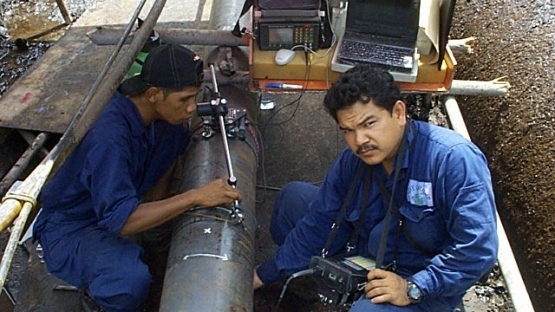Industrial testing using nuclear technology has contributed to the competitiveness of Malaysia’s manufacturing sector, industry players have said. The country has also built itself an export niche in South-East Asia, offering non-destructive testing (NDT) with nuclear devices to manufacturers in neighbouring countries.
“The fact that we can get NDT services of a good quality level at a very reasonable price allows us to spend more money on inspection, and thus improve our competitiveness as well as the level of safety of our plant,” said Zamaludin Ali, senior engineer at oil company PETRONAS. Before the development of a local NDT industry and accreditation system for testing services, PETRONAS and other companies in Malaysia had to rely on foreign NDT providers, or local companies hiring operators certified abroad, he explained.
NDT using nuclear techniques involves the use of ionizing radiation to test the quality of finished products. It is based on the same principle as X-rays used in hospitals (see Non-destructive testing). Oil pipes, boilers, pressure vessels, aircraft equipment and ships are among the products whose quality is tested with the technique.
The IAEA has played an important role in helping Malaysia to establish accredited training agencies and a certification system, and to promote NDT technologies such as radiographic testing. As a result of this long-standing partnership, over 50 companies in Malaysia, employing more than 2000 technicians, are certified to carry out NDT testing.
Building local expertise
It all began in the 1980s, when Abdul Nassir Ibrahim, a junior official with Malaysian Nuclear Energy at the time, first attended a series of IAEA training courses on NDT. With support from his Government and assistance from the IAEA, he helped set up the National NDT Certification Board, from which he retired last year. Nassir Ibrahim is currently managing the Madani NDT Training Centre near Kuala Lumpur.
Companies in the oil and gas sector account for around 70 per cent of all NDT inspection business in Malaysia, Nassir Ibrahim explained. Power plants, shipyards and the aviation industry are other important clients that benefit from this technology. The cost of local inspections is about one fifth of the cost of hiring inspectors and using technology from overseas, he said.
The Malaysian example shows that it is possible to build an internationally recognized testing system from scratch.




